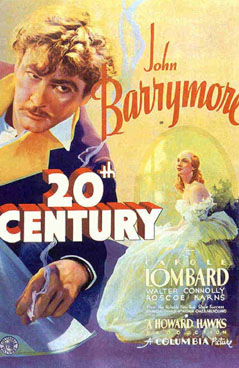and Mildred "Lily Garland" Plotka aboard the Twentieth Century limited.

Oscar Jaffe is involved in a mutually self-destructive romantic relationship with a blonde. Despite theatrical threats of suicide, the woman leaves him. He thinks he can do without her, but in time he grows desperate. When chance throws them together, he becomes maniacally manipulative, again using the threat of his own death to get her to rejoin him. She has succeeded without him, but despite her protests they are a perfect match. Both are self-dramatizingly hysterical, capable of tantrums that can be turned on and off at the drop of a hat. Although she treats her eventual return to him as a defeat, each is really the other's best audience. They are arguing furiously at the end, but it is really a happy ending.
The film is Twentieth Century (1934), starring John Barrymore and Carole Lombard. Howard Hawks directed it. Historians treat it as an early specimen of the "screwball comedy." That's always been one of the more vague genre labels. It usually seems to mean that characters act crazy, but characters frequently acted crazy in movies before the turning-point year of 1934, which also saw It Happened One Night emerge as a kind of founding film. I guess two things really distinguish screwball from the movies of the Marx Bros. or other zany comedians. First, the vaudevillian tendency to break the fourth wall and address the audience is gone. Second, the romantic leads rather than outright comedians carry the burden of the comedy. You could almost think of screwball as the second stage of a contagion that the Marxes and other acts spread from the advent of talkies to a point when it spread to the general population. Hawks' 1938 film Bringing Up Baby, with Katherine Hepburn as a screwball heiress, is usually considered the peak of the genre.
Barrymore gives a self-parodying performance, as he was a "Master Thespian" of his day before booze destroyed him. It's self-parody on another level thanks to all the references to Svengali, since Barrymore had made a rather good movie of that story back in 1931. I don't know how deep in drink he was at this point, but he's camouflaged by actors Walter Connolly and Roscoe Karns who do more blatant drunk acts at different points in the picture. I found Carole Lombard to be rather shrill, but it's okay for her to be obnoxious since this isn't one of those stories where you're necessarily rooting for the likable lovers to get back together.
The mentality of the film is more like that of a Coen Bros. film in its overall hard-boiled attitude. That attitude is often equated with cynicism, but I think it can be described more subtly as fatalism plus perseverance. It's the attitude of people who are not optimists, yet do what they've got to do. It contrasts strongly with the introverted self-pity that characterizes most acting in our time. It's probably a Depression attitude, though it can't be called "depressed." It involves an understanding that if you're going to try to survive in hard times, you can't waste time bemoaning everything. It's an attitude that may make a comeback soon if Americans apply themselves. It's one of the qualities that makes Twentieth Century a fairly funny film. Another, from my personal perspective, is the use of a religious fanatic (and all-round lunatic) as comedy relief that ultimately adds an element of farce to the plot. The film is definitely worth a look the next time it turns up on Turner Classic Movies, where I saw it this morning.

No comments:
Post a Comment